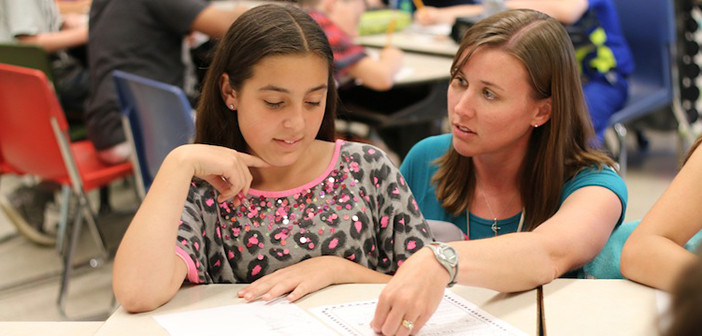By Jeff Keeling
A quiet hum pervades Jennifer Galloway’s fifth-grade math classroom at Gray Elementary as students in small groups spend 12 minutes each on a variety of learning centers. TCAPs are over, but the young students appear dialed in on the challenges Galloway – one of Washington County Schools’ three 2015 teachers of the year – has set before them.
That’s just how the sixth-year teacher wants it, she says, explaining why getting her charges to enjoy learning is a major part of her teaching philosophy.
“I enjoy taking something that kids are finding really difficult, especially kids who may not have that support at home, and finding a creative way to make it fun for them,” Galloway says.
“It might be as simple as doing a project with them and pointing out, ‘by the way, I know you’re really having fun making this kite, but look at all the math we’ve used – you’ve actually created a tetrahedron – what is that?.’ And then being able to pull apart the pieces that you really want them to get out of that lesson.”
Keeping kids motivated gains importance around her grade level, Galloway says. “You still have some really eager learners, but you have kids that have just really struggled, and they’re starting to become reluctant. Those are the kids I really try to focus on finding creative ways to reach.”
Galloway (grades 5-8), West View Elementary third grade teacher Nikki Combs (pre-K through 4) and Charles Rhoton (grades 9-12), a biology teacher at Daniel Boone High School, were tapped by fellow teachers at their respective schools. Their applications, which include descriptions of their teaching philosophies, community involvement and other information, were then vetted along with the picks from each school by a panel of administrators working independently of one another. The system has about 650 teachers.
Galloway, who hosts a “Math in Careers” week annually that she believes helps her students see the many ways adults apply math to their work, says she was “floored” to be selected. In addition to the career week and her philosophy of reaching all her students, Galloway says she goes out of her way to involve parents, making sure they know what’s going on in the classroom and giving them opportunities to come in and help.
The opportunities Rhoton focuses on with students revolve largely around hands-on learning. The former clinical laboratory scientist, who worked in the medical field, entered teaching as a second career in 2005.
“Kids love hands on,” Rhoton says, row upon row of lab sinks stretching behind him in his classroom. “I think my background in the lab has really helped me have that knowledge to be able to set up a lot of different things for the kids.”
Rhoton, who teaches biology and advanced placement biology, has secured numerous grants over the years to help augment the equipment available to students for that hands-on learning, which he says pays off for students when they’re asked to prove their competency on tests.
“I think they can visualize those experiments and it translates into a lot more comprehension.”
Combs, who has taught at West View for six years, is all about comprehension. Having assisted in developing a new writing curriculum for the district and been heavily involved with math enrichment programs through East Tennessee State University and Eastman Chemical Co., Combs still gets the most reward out of seeing a struggling student reach the “aha” moment of comprehension.
“I love seeing their faces when I can clearly tell that I have flipped the learning switch for them and their light bulb finally shines bright,” Combs says.
Washington County’s Director of Schools, Ron Dykes, says the annual awards are important, even though teachers don’t start a year trying to figure out how they might get one of the few accolades available to them. “I think all teachers are proud when someone in their profession receives an award,” Dykes says. “I think it speaks volumes to the profession itself and I think that’s what’s important.”
A former biology teacher himself, Dykes says having a good number of second-career teachers like Rhoton, and more who are experts in their disciplines, is a big advantage for the system.
“There’s no question that it has the potential to offer a different level of instruction and a more in-depth knowledge base when high-end questions arise. They have the capability of taking an advanced class deeper into a subject.”
Rhoton calls the switch to teaching, “one of the best moves I’ve ever made.
“Being able to convey my knowledge to students and watch them grow over the years is why I do this. I want to see them learn.”
Galloway says she hopes students will always be able to explore their subjects deeply as K-12 public education continues to undergo myriad changes.
“When they do a project, kids, go off on these tracks of their own where they really get into critical thinking.
“The most important thing is keeping the kids the center of it, understanding where they’re coming from and trying to continue to motivate them.”






